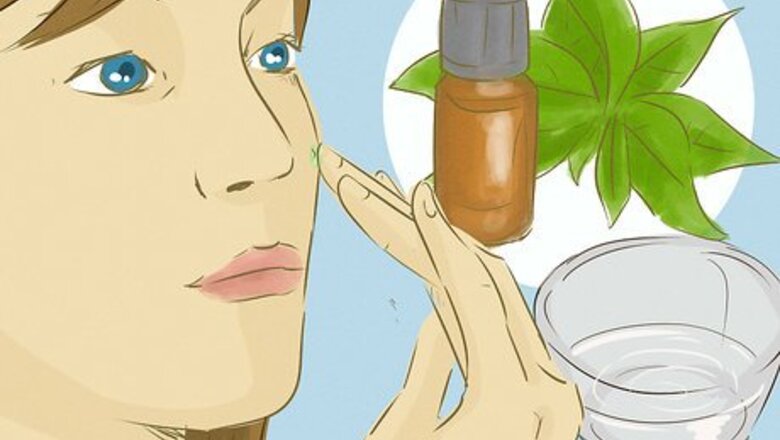
views
X
Research source
[2]
X
Research source
Cleansing and Moisturizing Your Skin
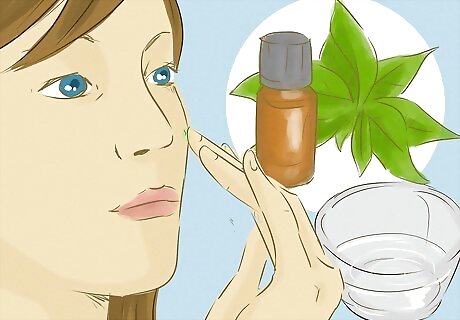
Choose a natural cleanser. Harsh soaps that contain alcohol, fragrances, deodorant and other chemical scan remove moisture from your skin so you should avoid them. Instead, choose a plant-oil based soap. Look for a soap that contains glycerin, jojoba oil, coconut oil or almond oil. These will clean your skin while adding much-needed moisture. You can also bathe without soap or choose a soap-free cleanser.

Bathe in warm water. Since too much water on your body can actually dry your skin, take fewer baths or shower every other day. Always use warm water instead of steaming hot water since hot water can strip your skin of natural oils. Warm water is less drying than hot water. When you do bathe, keep the bath or shower around five to 10 minutes long. Avoid adding bath oils to your water. This can make your bathtub slippery and increase the risk of falling.
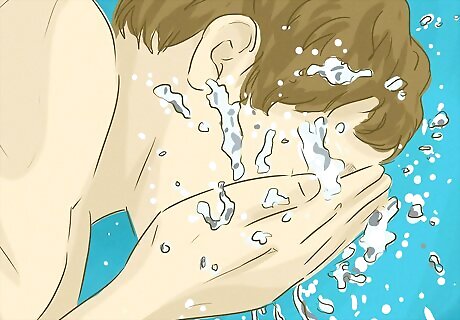
Gently wash and dry your skin. You should use just your hands to wash your skin. But if you want to use washcloths, scrub brushes or poufs, be gentle since rough washing can damage delicate aging skin. When you're ready to dry off, consider air drying for a few minutes before applying a moisturizer. If you want to dry off with a towel, pat yourself dry instead of rubbing. This is gentler on your skin.
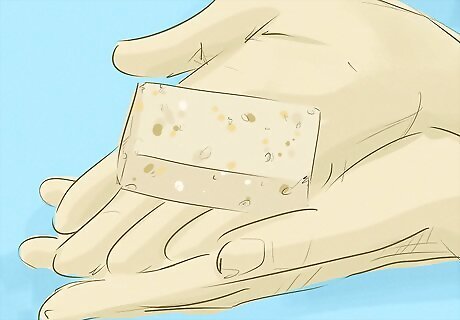
Choose a natural moisturizer. Research natural products (like jojoba oil, olive oil, or shea butter) that don't contain fragrance since these can cause allergic reactions. Look up products on the Environmental Working Group's online database to determine if a moisturizer contains toxic ingredients or has been linked to allergic reactions or cancer. You should also look for products with ingredients that help your skin hold in water while smoothing out wrinkles. These ingredients include: Ceramides Glycerin Hyaluronic acid Lanolin Linoleic, linolenic, and lauric acids (these are emollients)
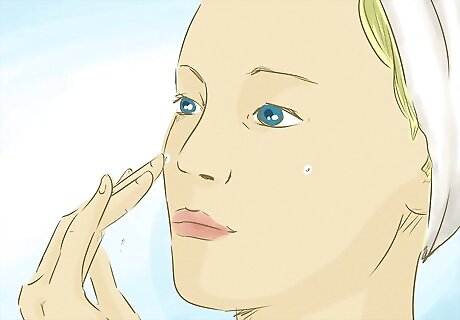
Apply moisturizer after bathing. Don't wait to apply a moisturizer. Since creams and ointments work by locking in moisture, your skin will stay better hydrated if you apply moisturizer while it's still damp from a shower or bath. Try to do this within three minutes of bathing. Remember to reapply moisturizer throughout the day as your skin begins to feel dry. Aim to moisturize your skin at least twice a day.
Protecting Your Skin As You Age
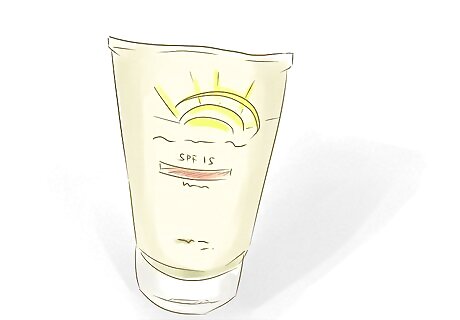
Use sunscreen throughout the day. Some sunscreens are marketed as being moisturizing which can prevent dry skin. Choose a sunscreen with an SPF of at least 30. The label should say that it's broad spectrum (meaning that it will block both UVA and UVB radiation). Use enough sunscreen to fill a shot glass to cover your body, and reapply sunscreen every two hours throughout the day. The sun's rays can cause premature aging, wrinkling, and drying of your skin. This is why it's important to use sunscreen every day. If you have trouble applying a lotion sunscreen, consider using a spray-on sunscreen.

Wear protection in the sun. If you know you'll be exposed to the sun, you should also wear physical protection like hats, sunglasses, long pants, and long sleeves. If the weather is warm, make sure your clothing is loose-fitting. You can wear natural fibers (like cotton, linen, and silk) to keep you cool and wick away moisture. You should also wear sunglasses that block UVA and UVB rays. While this won't keep your skin dry, it can protect your eyes from damaging rays.

Avoid direct sun and tanning beds. If you use tanning beds or lay out in the sun, you should think about stopping. The U.S. Department of Health and World Health Organization have both declared UV radiation from tanning and sunning to be a known carcinogen (meaning that it causes cancer). This UV radiation prematurely ages your skin, adding wrinkles and drying the skin. You should also limit the amount of time you spend outdoors in the full sun. Limit your exposure during the hours of 10am and 3pm. This includes cloudy days.
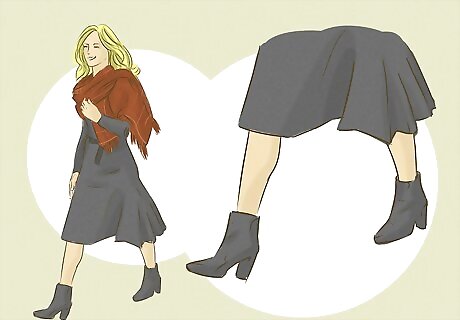
Pay extra attention to dry skin during the winter. Since the air is drier during winter months, most people experience some dry skin. It's especially important to protect your skin from the elements by wearing gloves, scarves, and hats. You should also avoid damaging your skin by sitting in front of the fire or other heat sources. It may help to run a humidifier. A humidifier will introduce moisture into the air, which can prevent your skin from drying out.

Get medical attention. Dry skin is a normal part of aging, but if nothing give you improved skin within two to three weeks, call your physician or dermatologist for a consultation. You may have a medical condition that is associated with dry skin. Your doctor or dermatologist can diagnose or rule out one of these conditions: Eczema Atopic dermatitis Fungal infections (like athlete’s foot) Seborrheic dermatitis Thyroid diseases Psoriasis Sjogren’s Syndrome
Making Lifestyle Changes to Prevent Dry Skin
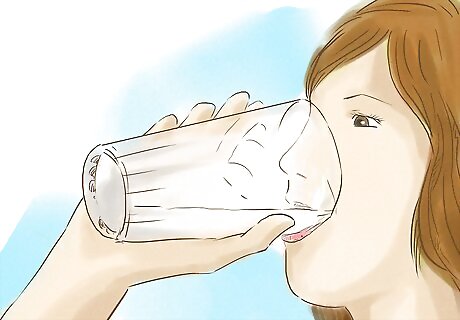
Drink water throughout the day. Studies have shown that people drink less water as they age. As you age, you may need to learn to drink more water, even if you're not thirsty. Try to drink water throughout the day, especially if you pinch your skin and it remains tented for several seconds (a sign that you're not well hydrated). Women should aim for nine 8-oz glasses (2.2 liters) daily and men should aim for 13 (3 liters). If you are in a hot environment, exercising, or sweating, you may need to drink more.
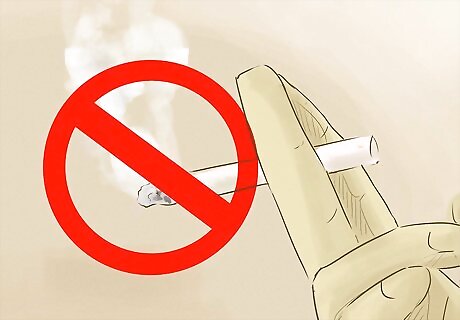
Quit smoking. Smoking can cause your skin to age faster than exposure to UV radiation from sunlight (or tanning beds). Research on smoking and premature aging of the skin shows that smoking reduces your skin's elasticity, increases the development of wrinkles, and can cause skin discoloration and loss of skin tone. Talk with your doctor about resources that will help you quit smoking. Cessation aids, support groups, and medications are all available to help you quit.
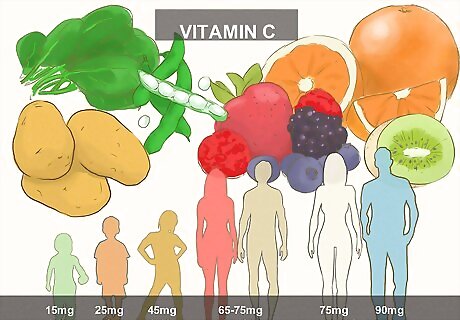
Take antioxidant supplements. Antioxidants may reduce the signs of aging in the skin. Some anti-aging creams contain these antioxidants, but research shows that the best form of antioxidants comes from your diet. You can also take them in supplement form (according to the manufacturer's instructions). Try to include vitamins A, C, D, E, beta carotenoids, and polyphenols. Some of the best food sources of these antioxidants include: Tomatoes Strawberries Citrus: oranges, grapefruit, lemons, limes Cantaloupe Apricots Broccoli Sweet potatoes Spinach
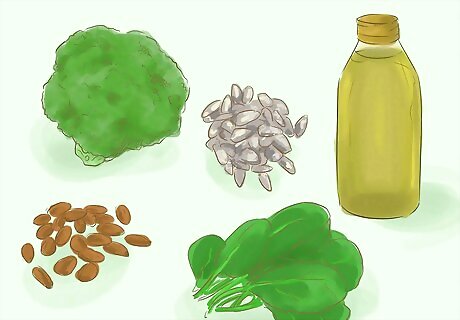
Include more omega-3 fatty acids in your diet. A diet high in omega-3 fatty acids can protect your skin as you age while keeping your skin hydrated. Omega-3 fatty acids do this by preserving the collagen in your skin. Fish (like salmon, mackerel, sardines, and albacore tuna) and shellfish are great sources of omega-3 fatty acids. For plant-based sources of omega-3s, try: Seeds: flaxseed, chia seeds, pumpkin seeds, sunflower seeds, sesame seeds Oils: hemp oil, soya oil, canola oil Leafy green vegetables Avocados Walnuts
















Comments
0 comment